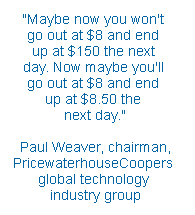|
Sober environment for dot.coms
|
 |
April 17, 2000: 5:25 p.m. ET
VC's still interested, IPOs still possible, but valuations will be more realistic
|
NEW YORK (CNNfn) - The dramatic drop in technology stocks over the past several weeks may indeed be ushering in a new era for Internet companies, one based on sound financials, good technology and not nearly as much hype.
The serious slide in share prices of many high technology companies doesn't mean there is going to be less venture capital. Nor does it mean going public is going to be impossible. It does mean that companies seeking early or late stage funding, will need a to prove they can turn a profit and they may have to tune down their expectations of becoming overnight millionaires.
"What is happening is getting back to more realistic returns," said Paul Weaver, chairman of PricewaterhouseCoopers global technology industry group. "Maybe now you won't go out at $8 and end up at $150 in a day. Now maybe you'll go out at $8 and you're at $8.50 the next day."
A dose of reality
Analysts agree the Internet sector was simply overextended, too much money  chasing too few really good ideas. Rather than signaling the beginning of a very gloomy period for dot.com entrepreneurs, many analysts see this as a healthy move for the sector in general. chasing too few really good ideas. Rather than signaling the beginning of a very gloomy period for dot.com entrepreneurs, many analysts see this as a healthy move for the sector in general.
At a gathering of dot.com entrepreneurs and venture capitalists last week in New York, the VCs agreed the Internet sector was overheated and that a little dose of reality would be a good thing for high tech companies over the long haul.
Ed Sim, managing director of venture capital funds at Wit Capital said the market fluctuations forced them to revise the price range for its companies that are going public. "That hurt a little," he said. "But we generally view this as a healthy thing for the market."
Jerry Colonna, managing partner at Flatiron Partners, added that entrepreneurs seeking funds should expect to reduce their valuations in light of recent market activity. But asked whether his company or other VCs would slow the pace of investment in the high tech sector, Colonna responded: "Nah. There's too much money out there to be invested."
B2C not the place 2B
Venture capitalists agree that Internet companies are going to play an increasingly important role in the U.S. economy because they carry the promise of improving productivity. Weaver said the conditions that led to record venture investment in high tech and Internet-related companies persist, so he expects the venture money will continue to flow to those Internet companies that truly have the ability to turn a profit.
"There is a lot of money out there and the marketplace, in terms of opportunities for new ideas, still couldn't be better," said Weaver.
Last year, venture investments in Internet-related businesses exploded, increasing to nearly $20 billion from $3.4 billion in 1998. Analysts agree the one sector of the Internet business that will be hardest hit is the business-to-consumer companies. Most of the so-called B2C companies have spent far too much money marketing themselves to consumers, but have yet to turn a profit.
"It's a model that doesn't work," said Bob Lessin, chairman of Wit Capital. "The customer acquisition cost is simply too high."
VCs, Wall Street not always on the same page
Venture capitalist confidence aside, Wall Street jitters forced several companies to postpone their initial public offerings due to market conditions. The most prominent of the cancellations was AltaVista, the Internet portal.
The company, one of the most visited sites on the Internet, was due to offer 14.8 million shares, valued at about $255 million, on Monday. AltaVista lost more than $272 million on revenue of $50.9 million in the three months ended Jan. 31.
AltaVista joins a series of other companies that have cancelled IPOs because of depressed market conditions, but since it is larger and more established than many of the others, its decision to postpone stands out as a sign of more bad news for the markets and the high-tech sector.
"AltaVista was one of the name-brand companies on the docket, and it's controlled by CMGI (CMGI: Research, Estimates), and they felt right now is not the best time to float an initial public offering," Jeffrey Hirschkorn, IPO analyst of IPO.com, told CNNfn's "Before the Bell." 
|
|
|
|
|
 |

|

